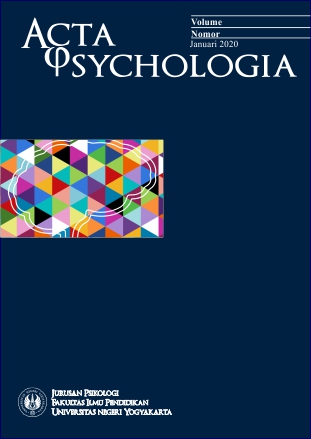Pengaruh Kecenderungan Gaya Cinta Mania terhadap Kepuasan Hubungan Romantis pada Emerging Adulthood
DOI:
https://doi.org/10.21831/ap.v4i2.57584Keywords:
mania love style, romantic satisfaction relationship, emerging adulthoodAbstract
Penelitian ini bertujuan untuk mengetahui pengaruh kecenderungan gaya cinta mania terhadap kepuasan hubungan romantis pada subjek emerging adulthood. Penelitian ini menggunakan pendekatan kuantitatif dengan jenis penelitian survei. Sampel penelitian berjumlah 310 orang dengan menggunakan metode accidental sampling. Kriteria subjek yang terlibat yaitu berusia 18 – 25 tahun, sedang menjalin hubungan romantis (berpacaran), dan berdomisili di Daerah Istimewa Yogyakarta. Pengumpulan data menggunakan metode kuesioner yang disebarkan secara online, dengan menggunakan instrumen subskala dari Love Attitude Scale (LAS) yaitu gaya cinta mania (α=0,861) dan skala kepuasan hubungan (reliabilitas α=0,759). Teknik analisis data pada penelitian ini menggunakan regresi linear sederhana. Hasil penelitian menunjukkan bahwa tidak terdapat pengaruh gaya cinta mania terhadap kepuasan hubungan romantis dengan signifikansi sebesar 0,118 (p > 0,05). Hal ini dimungkinkan karena adanya faktor lain seperti: 1) subjek memiliki lebih dari satu gaya cinta, 2) adanya afeksi yang diterima pasangan meskipun pasangan memiliki gaya cinta mania, dan 3) adanya faktor budaya
References
Acevedo, B. P., & Aron, A. (2009). Does a long-term relationship kill romantic love?. Review of General Psychology, 13(1), 59–65. doi.org/10.1037/a0014226
Arnett, J. J. (2000). Emerging adulthood: A theory of development from the late teens through the twenties. American Psychologist, 55(5), 469–480. doi.org/10.1037/0003-066X.55.5.469.
________. (2004). Emerging adulthood: The winding road from the late teens through the twenties. New York: Oxford University Press.
Chowdhury, T., Islam, A., & Rahman, S. T. (2016). Adaptation of Relationship Satisfaction Scale for use in Bangladesh. Bangladesh Psychological Studies, 26, 25-32.
Couch, L. L., Baughman, K. R., & Derow, M. R. (2017). The Aftermath of Romantic Betrayal: What's Love Got to Do with It? Current Psychology, 36(3), 504–515. doi.org/10.1007/s12144-016-9438-y
Couperthwaite, L. M. Z. (2015). Relationship satisfaction among individuals of diverse sexual orientations and gender identities: The role of love and attachment styles. University of Toronto, Toronto: Unpublished doctoral dissertation.
De Andrade, A. L., Wachelke, J. F. R., & Howat-Rodrigues, A. B. C. (2015). Relationship Satisfaction in Young Adults: Gender and Love Dimensions. Interpersona: An International Journal on Personal Relationships, 9(1), 19–31. doi.org/10.5964/ijpr.v9i1.157
Dinani, P. T., Zarbakhsh, M., Samkhaniyan, E., Hamidi, M., & Arkiyan, F. (2014). Study On the Relationship Between Love Attitudes and Marital Satisfaction Among Married Women. European Online Journal of Natural and Social Sciences, 468-474.
Doron, G., Derby, D. S., Szepsenwol, O., & Talmor, D. (2012). Tainted love: Exploring relationship-centered obsessive compulsive symptoms in two non-clinical cohorts. Journal of Obsessive-Compulsive and Related Disorders, 1(1), 16–24. doi.org/10.1016/j.jocrd.2011.11.002
Goodboy, A. K., Horan, S.M.,& Booth-Butterfield, M. (2012). Intentional jealousy-evoking behavior in romantic relationships as a function of received partner affection and love styles. Communication Quarterly, 60(3), 370–385.
Goodboy, A. K., Myers, S. A., & Members of Investigating Communication. (2010). Relational Quality Indicators and Love Styles as Predictors of Negative Relational Maintenance Behaviors in Romantic Relationships. Communication Reports, 23(2), 65–78. doi: doi.org/10.1080/08934215.2010.511397
Graham, J. M. (2011). Measuring love in romantic relationships: A meta-analysis. Journal of Social and Personal Relationships, 28(6), 748–771. doi.org/10.1177/0265407510389126.
Himawan, K. K. (2017). Jealousy and relationship satisfaction among Indonesian dating adults. PsyCh Journal, 1-2.
Ibrahim, M. A., Mohamad, N., Malek, M. A., Hoesni, S. M., & Sulaiman, W. W. (2019). Narcissistic Personality, Love Styles and Love Satisfaction as Predictors to Infidelity. Journal of Social Scienes and Humanities, 16, 1-9.
Kansky, J. (2018). What's love got to do with it?: Romantic relationships and well-being. In E. Diener, S. Oishi, & L. Tay (Eds.). Handbook of well-being. Salt Lake City, UT: DEF Publishers. DOI:nobascholar.com
Kiecolt-Glaser, J. K., & Wilson, S. J. (2017). Lovesick: How Couples' Relationships Influence Health. Annual Review of Clinical Psychology, 13(1), 421–443. doi: doi.org/10.1146/annurev-clinpsy-032816-045111
Mishra, S., & Sharma D. (2015). Do love styles predict relationship satisfaction?. Journal of Positive Psychology, 4, 73-83.
Raffagnino, R., & Puddu, L. (2018). Love Styles in Couple
Relationships: A Literature Review. Open Journal of Social Sciences, 06(12), 307–330. doi.org/10.4236/jss.2018.612027
Rohmah, S., & Legowo, M. (2014). Motif Kekerasan dalam Relasi Pacaran di Kalangan Remaja Muslim. Paradigma, 2(1), 1-9.
Rohmann, E., Fí¼hrer, A., & Bierhoff, H. W. (2016). Relationship Satisfaction Across European Cultures: The Role of Love Styles. Cross-Cultural Research, 50(2), 178 – 211. DOI: doi.org/10.1177/1069397116630950
Santrock, J. W. (2019). Life Span Development (7th edition). New York: McGraw-Hill Education
Stenberg, R. J., & Weis, K. (Ed.). (2006). The New Psychology of Love. New Heaven: Yale University Press.
Taylor, S. E., Peplau, L. A., & Sears, D. O. (2009). Psikologi Sosial, Edisi ke-12. Jakarta: Kencana Perdana Media Group.
Vedes, A., Hilpert, P., Nussbeck, F. W., Randall, A. K., Bodenmann, G., & Lind, W. R. (2016). Love styles, coping, and relationship satisfaction: A dyadic approach. Personal Relationships. doi.org/10.1111/pere.12112
Weisskirch, R. S. (2016). Abilities in Romantic Relationships and Well-Being Among Emerging Adults. Marriage & Family Review, 53(1), 36–47. doi.org/10.1080/01494929.2016.1195471
Downloads
Published
How to Cite
Issue
Section
License
Acta Psychologia allows readers to read, download, copy, distribute, print, search, or link to its articles' full texts and allows readers to use them for any other lawful purpose. The journal allows the author(s) to hold the copyright without restrictions. Finally, the journal allows the author(s) to retain publishing rights without restrictions
- Authors are allowed to archive their submitted article in an open access repository
- Authors are allowed to archive the final published article in an open access repository with an acknowledgment of its initial publication in this journal

This work is licensed under a Creative Commons Attribution-ShareAlike 4.0 Generic License.










